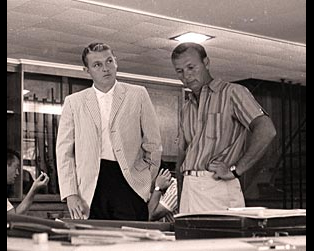
The business built on a handshake
Tonight on the BBC is the 60th Anniversary edition of The Sports Personality of the Year. Tennis star Andy Murray is hot favourite, but golfer Justin Rose is one of the other candidates. All of which seems like a good excuse to tell the Mark McCormack story. He was a man who played a major role in transforming sports broadcasting and marketing and took sports’ personalities to another level.
The business built on a handshake
When he was only 6 years old, an already sports mad Mark McCormack was struck by a car as he crossed the street in his home town of Chicago. He fractured his skull. The accident set in motion a series of events that was to change not only McCormack’s life but also the whole future of sports and entertainment marketing.
When he finally recovered from his injuries, his doctors advised against playing any contact sports, so his father, Ned, bought him a set of golf clubs and encouraged him to take up the game.
Golf was soon young Mark’s passion. He played on the golf team at Virginia’s College of William & Mary and qualified as an amateur for the U.S. Open of 1958.
It was, however, while playing for William and Mary that McCormack first met the young Wake Forest golfer who would change his life. The young golfer’s name was Arnold Palmer.
After Wake Forest, Palmer headed off for a career in professional golf. After William & Mary, Mark headed off first to Yale Law School and then to a law firm in Cleveland. They kept in touch and a friendship was born.
In 1960 Mark had an idea. He saw could see the rising value of athletes. In an era when golf’s popularity was rising and televised sport was emerging, he felt there was an opportunity for him to represent and maximize the earnings of golfers.
Meeting Palmer again, he pitched his idea to him – a business where his new company would serve as personal business managers to handle professional golfers’ personal affairs.
“I’ll be your Clifford Roberts,” Palmer recalled McCormack saying. Now Roberts served as President Eisenhower’s “ultimate inner-circle man, advisor and protector, friend and counsellor, through good times and bad, thick and thin, and President Eisenhower entrusted him implicitly.”
Palmer took to the idea immediately. It would allow him to concentrate on his golf whilst someone he could trust looked after his business issues.
“[McCormack] asked for a contract. I said, ‘We don’t need a contract. We’ll just shake hands, and you’ve got a client’, that kind of shook him up a little, but he did it.”
In his book ‘A Golfer’s Life’ Palmer would reflect on that handshake again; “There was no contract between us because Mark knew my word was my bond and there would be no turning back on my part. The same was true of him, I knew, and those stories that you’ve heard about us never formalizing our business relationship in printed legalese, are true.
“That handshake was the beginning of our relationship and pretty much all the contract either of us required to get down to business.”
So down to business they got and in Palmer’s first two years with McCormack, his endorsement earnings grew from $6,000 to $500,000. Palmer won the Masters, but also played golf with presidents, and promoted Pennzoil and Hertz rental cars. It was the kind of success that the golf world (and indeed the entire sports world) hadn’t seen before.
Others wanted some of what Palmer was achieving and McCormack signed Jack Nicklaus and Gary Player helping him to create and then aggressively market what he christened “The Big Three.”
McCormack and his now rapidly growing company International Management Group (IMG) soon branched out into other sports and new clients included Rod Laver, Bjorn Borg and Jimmy Connors of tennis and Pele the world’s most famous footballer. Nick Faldo, Greg Norman, Pete Sampras, Tiger Woods and other legends would come later.
McCormack also backed his belief in the potential value that could be created by marrying sports, his famous clients and television and started a television division called Trans World International. It was another immediate success and some of its most popular programming now includes Big 3 Golf, American Gladiators, and Battle of the Network Stars, as well as shows promoting Barclays Premier League soccer, the ASP Tour, and World’s Strongest Man competitions.
Trans World International also negotiated television rights deals for the All England Tennis Club, the British Open, the NFL, Major League Baseball, and the NBA.
Perhaps not surprisingly in 1990, Sports Illustrated named McCormack the “Most Powerful Man in Sports.”
Following his death in 2003, Business Age said of him: “McCormack invented the sports business. It was he who first realized that, within the golden triangle of sport, sponsorship and television, lay vast wealth, just waiting to be tapped.”
And that wealth was first releashed with a simple handshake.